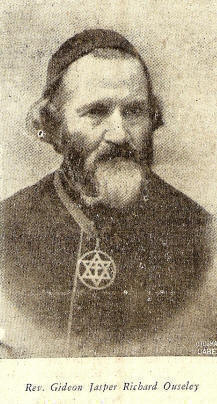It was in such circumstances that he sought to propagate his beliefs.
His desire was to saturate and transmute the Church’s own formularies
with the true teaching of Christ and His Humanitarianism. He set about
revising the formularies in place of concealing them.
While he was not a sectarian and hated to be dubbed as such, he would
work with all true reformers and good men who would try to bring the
people into ways of righteousness and raise them out of their barbarous
habits of flesh-eating, strong drinking, and cruelty of every sort and
kind.
He considered that “the direct cause of poverty, bad health and social
misery was due to flesh-eating, alcoholic drinking and tobacco smoking”.
He saw in their abolition “the only effectual means of the world’s
redemption, whether as regards men themselves or the animals”. “The true
and proper food for man was that which Mother Earth brought forth in
plenty for the sustenance of her children”.
He founded the Order of At-one-ment and United Templars Society, having
for its motto: “One God, one Religion, various names, various forms.”
Its object was to bring about a reconciliation of opposing ideas,
things, persons, and systems; at-one-ing the human with the Divine, and
man with God; by the Spirit of Christ within the soul.
On account of his views, the personal relationship between the reformer
and his Church became strained; which led, in the first instance, to the
Rev. Ouseley being suspended, and later to his being, literally, cast
out of the Church. His views being called “Anti-Christian.”
This because, believing that he had been called to undertake this
important mission, he set about to present to the world the hidden text
“The Gospel of the Holy Twelve,” the Christian Dispensation pieced
together from the most ancient and complete collection of Christian
fragments, preserved in one of the Monasteries of the Buddhist monks in
Thibet, where it was hidden by some of the Essene community for safety
from the hands of the Corrupters and for the first time to be translated
from the Aramaic. It was a translation of an original Aramaic document
purporting to be a reconstruction and revision of the Gospel narrative.
Also because the contents of this most ancient Gospel set forth a higher
moral and religious teaching, as the basis of the Christian Church, than
any other that has come down to us, requires but the reading of eyes
divested of prejudice, and the perception of a regenerate heart, and
intelligent mind, to receive and appreciate that the Rev. Ouseley was
undaunted in proclaiming the true religion of Christ.
One thing is unquestionable, he could not unaided by some Power higher
than and above that of his normal intellect, have written this Gospel,
and that such Power was of a Divine nature, is manifest from its
contents. At the end of the Gospel are the words: “Glory be to God by
Whose Power and help it has been written.”
It must not on this account be assumed that the original of which this
Gospel is claimed to be a translation is of greater historical value
than are the Four Gospels— none of which is historical in the sense
commonly supposed—the object of all being to portray “the divine drama
of the Spiritual history of man”—that is, of the Soul. But this Gospel
has the advantage over the others in that it escaped the hands of the
“Correctors” and “Corrupters” from which they suffered.
In 1905, he wrote to a friend, “I have finished my work and my destiny
awaits me. They are ready to receive me”.
On the 9th of December, 1906 he passed away in his seventy-second year.
A notice of him appeared in “Light” (5th and 12th January, 1907): “And
now may he rest in peace with the knowledge that his life of
self-sacrifice for Truth and Humanity—a life without ambition for any
worldly honour or desire for any worldly gain—was not lived in vain, for
“Where Mercy, Love and Pity dwell, There God is dwelling too.”
